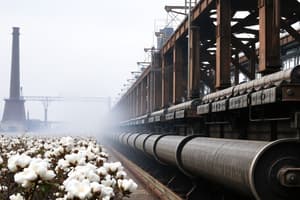Podcast
Questions and Answers
What are the main sectors of industry mentioned in the text?
What are the main sectors of industry mentioned in the text?
Primary, Secondary, Tertiary, Quaternary
How does industry contribute to economic growth?
How does industry contribute to economic growth?
By creating jobs, increasing productivity, and fostering innovation
Explain one positive and one negative environmental impact of industry.
Explain one positive and one negative environmental impact of industry.
Positive impact: Advances in renewable energy. Negative impact: Environmental pollution
What social impacts have been brought about by industrialization?
What social impacts have been brought about by industrialization?
How has globalization affected the industry?
How has globalization affected the industry?
What event marked the beginning of industry as a concept?
What event marked the beginning of industry as a concept?
When did the industrial revolution begin?
When did the industrial revolution begin?
How would you define industry?
How would you define industry?
What sectors are included under the concept of industry?
What sectors are included under the concept of industry?
What are some key features of the industrial revolution?
What are some key features of the industrial revolution?
Flashcards are hidden until you start studying
Study Notes
Unpacking the World of Industry
Industry is a broad and multifaceted concept that has shaped our modern world, driving innovation, economic growth, and the creation of the goods and services that fuel our daily lives. In this article, we'll dive into the intricacies of industry, exploring its history, diverse branches, and its impact on society.
Origins of Industry
Industry originated from the agricultural revolution, which began around 10,000 years ago, as humans transitioned from nomadic hunter-gatherer societies to settled agricultural communities. This shift led to an increase in productivity, allowing for the surplus of food and the subsequent rise of specialized crafts and trade. The industrial revolution, beginning in the 18th century, took this concept to new heights, introducing mass production, greater automation, and the use of steam and water power to harness energy.
Defining Industry
In its most basic form, industry refers to the production, transformation, and distribution of goods and services. It encompasses various sectors including manufacturing, agriculture, mining, construction, finance, and business services. These sectors are often interconnected, as the raw materials extracted and processed by one sector may become inputs for another sector.
Industry Classifications
Industry is typically classified into several branches:
-
Primary Industry: This sector focuses on the extraction, production, and processing of raw materials from natural sources, including agriculture, forestry, fishing, mining, and quarrying.
-
Secondary Industry: This sector involves the processing, manufacturing, and assembly of raw materials into finished goods. Examples include automotive manufacturing, textiles, electronics, and construction.
-
Tertiary Industry: This sector focuses on the delivery of services, such as banking, insurance, transportation, telecommunications, and business services.
-
Quaternary Industry: This sector includes knowledge-based activities, such as research and development, education, healthcare, and innovative technologies.
The Impact of Industry
Industry has revolutionized the way we live, work, and interact with one another, offering numerous benefits and challenges:
-
Economic Growth: Industry stimulates economic growth by creating jobs, increasing productivity, and fostering innovation.
-
Increased Standards of Living: Industry has helped to improve our standards of living by providing goods and services that enhance our comfort, convenience, and quality of life.
-
Environmental Impact: Industry can have a significant impact on the environment, both positive and negative. Advances in renewable energy, sustainable practices, and waste management help mitigate these impacts.
-
Social Impacts: The rapid pace of industrialization has led to changes in society, including the urbanization, the rise of the middle class, and shifts in cultural values.
-
Globalization: The globalization of industry has facilitated the flow of goods, services, capital, and people across borders, fostering international trade and increased interdependence among nations.
Conclusion
Industry, with its rich history and diverse branches, has played a pivotal role in shaping our world. This article has provided a brief overview of industry's origins, classification, and impact on society, offering insights into this dynamic and complex sector. As we continue to explore new frontiers and advance our knowledge and capabilities, the industry landscape is sure to undergo further transformations, shaping our future in ways we can only begin to imagine.
Studying That Suits You
Use AI to generate personalized quizzes and flashcards to suit your learning preferences.




